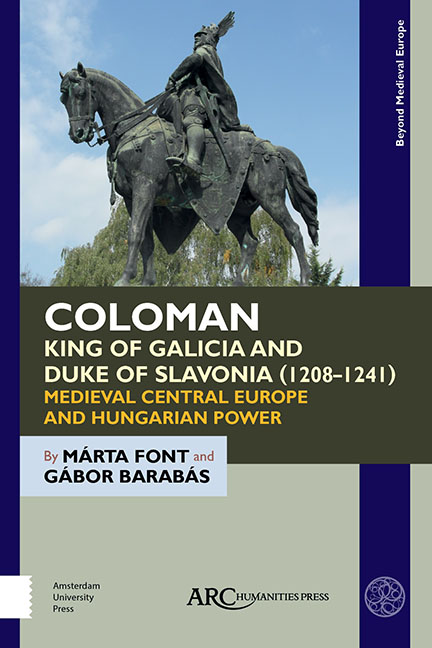 Coloman, King of Galicia and Duke of Slavonia (1208–1241)
Coloman, King of Galicia and Duke of Slavonia (1208–1241) Published online by Cambridge University Press: 20 November 2020
THE SONS OF the royal family had the right to bear the princely title (dux) and to possess the necessary estates to supply their needs. These lands were, like the queens’, scattered around the realm. Courts were organized around the princes, following the kings’ examples, despite their age. The coronation of minor-age heirs happened as early as the eleventh century, even though they may not be given a territory to rule over, or the kingdom could be divided. Andrew II was forced against his will to allow the coronation of his first-born, the eight-year-old Béla ([…] omnes conspiratores, et infidelitatis machinatores […] filium nostrum nobis viventibus et nolentibus in regem sibi praeficere, vel coronare attentauerint / […] all conspirators and unfaithful machinators […] tempted our son to get on the top of the realm or to be crowned despite our objection) Nevertheless, Prince Béla had no actual power in the government of the realm until he reached adulthood in 1220, and this was also the case in Galicia for Coloman. Coronation and an active role in the government were independent from each other, and every deci-sion remained in the king's gift.
The court established in Halych after Coloman's coronation consisted of local and Hungarian noblemen. They were entrusted by the Hungarian king, and furthermore, the officials of the queenly court were appointed by him too. A few members of Coloman's court are known to us since they also supported him later in Slavonia. One of them was Demeter of the Aba kindred, the master of the stewards of Coloman (1216–40). He was count of Bodrog between 1235 and 1240, and still alive in 1247, but his other offices are unknown. The GVC confirms his presence in Galicia at Coloman's side once before their captivity when File led the Hungarian army to Volhynia. After his departure, Coloman remained in Galicia with a smaller group in his court, and they are even named: “Ivan, Lekin, and Dmitr.” We agree with Antal Hodinka, who identified Dmitr with Demeter, yet the other two names refer to just one individual, in our opinion: Ivan Lenkin. It is entirely hypothetical, but it could refer to Ivakhin (Iwachin), count of Szeben (Sibiu).
To save this book to your Kindle, first ensure no-reply@cambridge.org is added to your Approved Personal Document E-mail List under your Personal Document Settings on the Manage Your Content and Devices page of your Amazon account. Then enter the ‘name’ part of your Kindle email address below. Find out more about saving to your Kindle.
Note you can select to save to either the @free.kindle.com or @kindle.com variations. ‘@free.kindle.com’ emails are free but can only be saved to your device when it is connected to wi-fi. ‘@kindle.com’ emails can be delivered even when you are not connected to wi-fi, but note that service fees apply.
Find out more about the Kindle Personal Document Service.
To save content items to your account, please confirm that you agree to abide by our usage policies. If this is the first time you use this feature, you will be asked to authorise Cambridge Core to connect with your account. Find out more about saving content to Dropbox.
To save content items to your account, please confirm that you agree to abide by our usage policies. If this is the first time you use this feature, you will be asked to authorise Cambridge Core to connect with your account. Find out more about saving content to Google Drive.